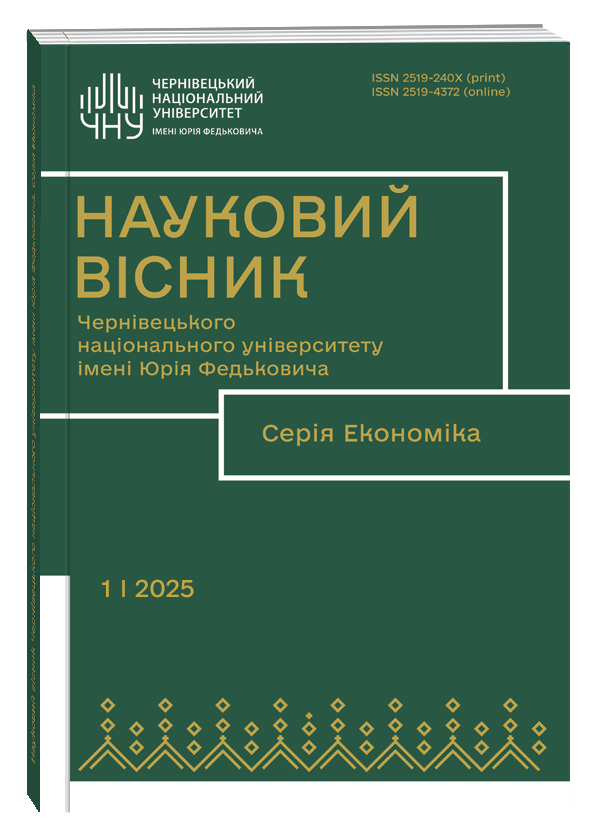FROM PHYSICAL BRANCHES TO ALGORITHMS: STRATEGIC POSITIONING OF BANKS IN THE DIGITAL WORLD
DOI:
https://doi.org/10.32782/ecovis/2025-1-8Keywords:
strategic positioning, digital transformation, banking sector, moral capital, service personalization, digital platforms, artificial intelligence, cybersecurity, embedded banking, digital ethicsAbstract
The article is devoted to the analysis of transformational processes in the banking sector driven by the rapid development of digital technologies. The traditional branch-centered banking model is gradually being replaced by platform-based solutions that rely on artificial intelligence, big data, and real-time algorithms. This shift necessitates a fundamental rethinking of banks’ strategic positioning, which increasingly depends on the implementation of technological innovations and the integration of moral capital as a strategic banking resource. It is established that the success of banks in the digital environment depends on their ability to harmoniously combine innovation with ethical responsibility. The personalization of financial services through artificial intelligence, the development of payment solutions, the construction of open ecosystems, and the establishment of partnerships with fintech companies have become defining trends. At the same time, challenges arise from cybersecurity risks, ethical dilemmas related to the use of clients’ personal data, and the threat of losing customer-centricity in fully algorithmized service environments. The article highlights the role of moral capital in banking, where transparency of operations, ethical interactions, and accountability for client data security become critical factors of long-term competitiveness in an era of accelerated technological advancement. A new concept of strategic positioning is proposed—one that is rooted not only in technological modernization, but also in the implementation of digital morality principles. Among the main directions for banks’ adaptation to new realities are the shift toward embedded banking models, integration of financial services into customers’ daily lives, utilization of artificial intelligence for personalized communication, development of omnichannel platforms, and enhancement of organizational flexibility. The future of banking will depend on the ability to create a seamless, user-friendly, and morally oriented financial environment, where strategic positioning combines technological leadership, deep understanding of consumer expectations, and the consistent integration of ethical foundations into banking practice.
References
Marous J. 2025 Retail Banking Trends and Priorities. Digital Banking Report. 2025. URL: https://www.digitalbankingreport.com/trends/2025-retail-banking-trends-and-priorities/
King B. Bank 4.0: Banking Everywhere, Never at a Bank. Wiley, 2018. 352 p.
Claessens S., Frost J. BigTech and the Changing Structure of Financial Intermediation. BIS Working Papers, No 779, 2020. URL: https://www.bis.org/publ/work779.pdf
Arner D. W., Barberis J., Buckley R. P. The Evolution of Fintech: A New Post-Crisis Paradigm? Georgetown Journal of International Law. 2016. Vol. 47(4). P. 1271–1319.
Etzioni A. The Moral Effects of Economic Institutions. Review of Social Economy. 2015. Vol. 73(3). P. 353–371.
Zingales L. Towards a Political Theory of the Firm. Journal of Economic Perspectives. 2017. Vol. 31(3). P. 113–130.
European Parliament. General Data Protection Regulation (GDPR). Regulation (EU) 2016/679. Official Journal of the European Union. 2016. URL: https://eur-lex.europa.eu/eli/reg/2016/679/oj
European Parliament. Digital Operational Resilience Act (DORA). Regulation (EU) 2022/2554. Official Journal of the European Union. 2022. URL: https://eur-lex.europa.eu/eli/reg/2022/2554/oj
McKinsey & Company. Global Banking Annual Review 2021: The Great Divergence. URL: https://www.mckinsey.com/~/media/mckinsey/industries/financial%20services/our%20insights/global%20banking%20annual%20review%202021%20the%20great%20divergence/global-banking-annual-review-2021-the-great-divergence-final.pdf
Accenture. (2021). Banking Technology Vision: Stretching the Digital Edge. URL: https://www.accenture.com/content/dam/accenture/final/industry/banking/document/Accenture-Banking-Technology-Vision-2021.pdf
Нікіфоров П. О. Розвиток бізнес-моделей банків за екосистемним підходом як стратегічна банківська інновація. Фінансові інструменти сталого розвитку економіки : матер. 5-ої міжнар. наук.-практ. конференції (Чернівці, 27 квітня 2023 р.). Чернівці : Чернівец. нац. ун-т ім. Ю. Федьковича, 2023. 496 с. С. 266–270. URL: https://archer.chnu.edu.ua/xmlui/handle/123456789/7313
Мейсон П. Посткапіталізм. Путівник у майбутнє / пер. з англ. Н. Мочалова. Київ : Наш Формат, 2019. 360 с.
Marous, J. (2025). 2025 Retail Banking Trends and Priorities. Digital Banking Report. Available at: https://www.digitalbankingreport.com/trends/2025-retail-banking-trends-and-priorities/
King, B. (2018). Bank 4.0: Banking Everywhere, Never at a Bank. Wiley.
Claessens, S., & Frost, J. (2020). BigTech and the Changing Structure of Financial Intermediation. BIS Working Papers, No. 779. Available at: https://www.bis.org/publ/work779.pdf
Arner, D. W., Barberis, J., & Buckley, R. P. (2016). The Evolution of Fintech: A New Post-Crisis Paradigm? Georgetown Journal of International Law, 47(4), 1271–1319.
Etzioni, A. (2015). The Moral Effects of Economic Institutions. Review of Social Economy, 73(3), 353–371.
Zingales, L. (2017). Towards a Political Theory of the Firm. Journal of Economic Perspectives, 31(3), 113–130.
European Parliament. (2016). General Data Protection Regulation (GDPR), Regulation (EU) 2016/679. Official Journal of the European Union. Available at: https://eur-lex.europa.eu/eli/reg/2016/679/oj-
European Parliament. (2022). Digital Operational Resilience Act (DORA), Regulation (EU) 2022/2554. Official Journal of the European Union. Available at: https://eur-lex.europa.eu/eli/reg/2022/2554/oj
McKinsey & Company. Global Banking Annual Review 2021: The Great Divergence. Available at: https://www.mckinsey.com/~/media/mckinsey/industries/financial%20services/our%20insights/global%20banking%20annual%20review%202021%20the%20great%20divergence/global-banking-annual-review-2021-the-great-divergence-final.pdf
Accenture. (2021). Banking Technology Vision: Stretching the Digital Edge. Available at: https://www.accenture.com/content/dam/accenture/final/industry/banking/document/Accenture-Banking-Technology-Vision-2021.pdf
Nikiforov, P. O. (2023). The development of banking business models under the ecosystem approach as a strategic banking innovation. In Financial Instruments for Sustainable Economic Development: Proceedings of the 5th International Scientific and Practical Conference (Chernivtsi, April 27, 2023) (pp. 266–270). Yuriy Fedkovych Chernivtsi National University. Available at: https://archer.chnu.edu.ua/xmlui/handle/123456789/7313
Mason, P. (2019). Post-Capitalism: A Guide to Our Future (Ukrainian ed., N. Mochalova, Trans.). Kyiv : Nash Format. (Original work published 2015)



